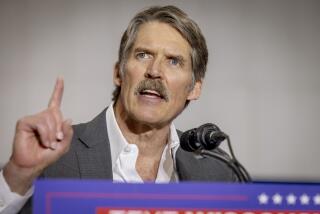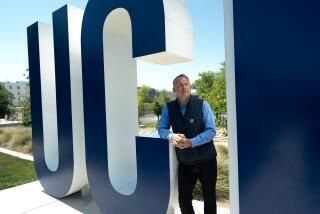Riordan Put Lobbyists on 21 City Commissions
As mayor of Los Angeles, Republican gubernatorial candidate Richard Riordan appointed nearly two dozen lobbyists to commissions overseeing some of the city’s most powerful agencies, a Times analysis shows.
So some of those lobbyists were surprised to hear Riordan profess strong distrust and disdain for lobbyists and their profession on the campaign trail last week. If he is elected governor, Riordan said, he would not allow lobbyists into his office, and he downplayed the need for their services.
Riordan appointed lobbyists to 21 city commissions overseeing such departments and agencies as the Harbor, Airport, Transportation, Zoning, Planning, Building and Safety, Water and Power, Recreation and Parks, and Redevelopment.
In each case, Riordan’s appointees either were registered city lobbyists when they were selected or they registered while serving on those civic panels, an examination of City Council and ethics commission records found.
Campaign aides said Riordan was unavailable for comment Monday. His senior policy advisor, Jaime de la Vega, said the former mayor’s appointment of lobbyists to commissions is a “nonissue.”
Riordan’s “primary point [in his remarks last week] was that you did not need to hire a lobbyist to have access to Dick Riordan as mayor, and you will not need to hire a lobbyist to have access to Dick Riordan as governor,” said de la Vega, who worked for Riordan in City Hall. Riordan faces two main challengers in next week’s primary election, financier Bill Simon Jr. and Secretary of State Bill Jones.
As mayor, de la Vega said, Riordan generally did not meet alone with lobbyists, preferring to meet with principals rather than their paid representatives. He encouraged his staff to do the same.
This is a familiar refrain for Riordan, who raised the lobbyist issue during his first campaign for mayor in 1993. After he was elected, he required that his staff record all contacts with lobbyists, but that effort was short-lived, according to people who worked in Riordan’s first administration.
“I hate it, I hate it with a passion,” Riordan said at that time, referring to the lobbying industry. “You need a godfather [at City Hall] if you want something. Any day at City Hall you can find [lobbyists] wandering about.”
But documents and interviews show that Riordan relied on lobbyists in a variety of ways when he was mayor. Aside from appointing nearly two dozen to commissions, he also hired some to help with special projects, including running campaigns for charter reform amendments and other issues.
Registered lobbyists, in fact, were found among Riordan’s inner circle, his business associates and his most trusted mayoral staff. His law firm, Riordan & McKinzie, registered as city lobbyists in 1993, the year Riordan became mayor. Several of Riordan’s deputy mayors became registered lobbyists after they left office.
Los Angeles’ citizen panels were designed to ensure public participation in government business. Commissions are also powerful tools for mayors to shape and direct policy. Mayors appoint about 200 of these mostly volunteer commissioners, who are given the authority to oversee departments and award contracts.
Some people object to the appointment of lobbyists to these positions because the practice presents potential conflicts. Lobbyists--184 were registered with the city in 2001--are paid to influence legislation and shape policy on behalf of their clients. They are a tight-knit group in City Hall who frequently share projects and clients; they also hire one another for particular campaigns and other efforts. Several also are political campaign consultants.
“Why do we have to have lobbyists on city commissions at all?” asked Bob Stern, head of the Center for Governmental Studies in Los Angeles.
“I think there are an awful lot of other people out there who could serve. The other question in my mind is how much benefit do they get serving on a commission, how much does it benefit their lobbying practice?”
On the other hand, some people, including several lobbyists, say they bring valuable knowledge of the inner workings of City Hall to these panels. They say they understand politics, and they can navigate through the maze of the bureaucracy.
Steve Afriat, for example, said he negotiated the resignation of the general manager of the animal regulation department while serving on that commission as a Riordan appointee. Afriat, a top City Hall lobbyist, said he was able to work with the City Council and the mayor’s office on behalf of the general manager, who ended up leaving his job without suing the city.
“Should there be 100 of us? I don’t know,” said Afriat, who was appointed by Riordan in 1995 to the commission and hired by Riordan a couple of times to run campaigns. “We bring some great skills, and we should be sprinkled around just like smart attorneys and homeowners’ activists.”
Afriat and other lobbyists who served on commissions appointed by Riordan said they were surprised by the former mayor’s recent comments, because these people felt welcome in City Hall during his eight-year tenure there. Afriat called Riordan hypocritical and disingenuous in his comments, saying there was a “swinging door” for lobbyists in the mayor’s office.
Lisa Specht, an attorney and registered lobbyist who was appointed as a Recreation and Parks commissioner in 1994 and reappointed in 1999, said one of Riordan’s strengths as mayor was that he listened to various points of view on any issue.
“He made decisions based on information from all sources, including lobbyists,” Specht said. “He wanted the facts, he wanted information. I was surprised by his comments.”
The city’s ethics commission in 1996 attempted to draft legislation to limit lobbying--and fund-raising--by city commissioners; that ordinance, however, became stalled in a council committee and was never enacted. It is noteworthy that several lobbyists also serve as campaign consultants to some council members.
Craig Lawson, who was appointed by former Mayor Tom Bradley to the Los Angeles Convention and Exhibition Center Authority in 1989 and reappointed twice by Riordan, said he asked the mayor’s staff to place him on a commission unrelated to his development lobbying activities. The mayor makes his selections for commissioners, and the council confirms them.
Sometimes, Riordan shuffled lobbyists from one commission to another. And at any given time, 10 or more city commissions contained registered lobbyists who also represented private clients. When Riordan left office in 2001, for example, at least 11 commissioners were also registered lobbyists with a combined list of about 60 clients.
Some lobbyists and others say these city commissioners benefit from the perception that they have an in at City Hall.
“I think anyone--lobbyist or not--benefits from being named a commissioner by a mayor, period,” said Carol Schatz, president of the Central Cities Assn., who was appointed to the Convention and Exhibition Center Authority. “There are only a certain number of spots. It indicates that the most important official in the city knows who you are.”
More to Read
Get the L.A. Times Politics newsletter
Deeply reported insights into legislation, politics and policy from Sacramento, Washington and beyond. In your inbox three times per week.
You may occasionally receive promotional content from the Los Angeles Times.






